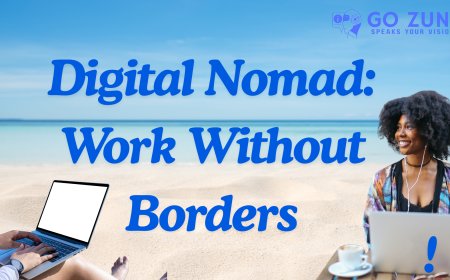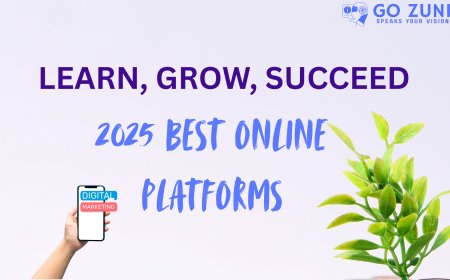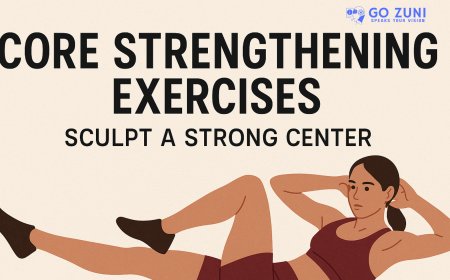Digital Nomad Life: How Gen Z Builds Global Businesses
Discover how Gen-Z is redefining work with remote jobs, tech tools, and a digital nomad lifestyle built around flexibility, freedom, and global goals.

The Rise of Gen-Z Digital Nomads
In a world constantly redefined by tech innovation and the post-pandemic hybrid work culture, Gen-Z working professionals are now reworking the rules of traditional employment to fit their own lives. Welcome to the world of digital nomads.
These new working professionals are armed with not only a laptop but also portable Wi-Fi, and an unshakable entrepreneurial mindset that allows them to choose autonomy and flexibility over rigid workplace cultures.
The rise of easily accessible co-working spaces, nomadic internet, and various platforms like Zoom or Google Teams providing different tools that make it easier for remote workers is why this generation is finally embracing freelance work, content creation, and remote jobs as the new professional identity.
This article aims to provide an insight into this new generation of digital nomadic workers to let readers know that corporate is not the only way.
Also read about why business and travel are a better mix than business and pleasure here.
What is a Digital Nomad?
This lifestyle is increasingly popular among Gen-Z professionals who prioritise flexibility, autonomy, and purpose-driven careers.
What does a Digital Nomad do?
These people generally have a minimalistic attachment to material possessions, and thus take on freelance jobs, remote jobs, or engage in content creation, which allows them to work remotely in temporary housing facilities, co-working spaces, or work from home.
Many leverage tech innovation, public Wi-Fi, or portable hotspots to stay connected, while others explore digital nomad visa options to extend their stay in countries that support the work for a digital nomad’s lifestyle.
This shift towards hybrid work, with the rise of jobs like travel blogger, online entrepreneur, and remote consultant, redefines the conversation surrounding a successful career.
How to become a Digital Nomad:
In the following section, we will be discussing a few pointers for those looking to become digital nomads themselves.
Step 1: Choose the Right Destination for you
There are several choices of places around the world that can be the best destination for you to embark on your digital nomad adventure. To choose this, you will need to determine the location that best suits your needs and preferences, especially those offering a digital nomad visa.
Firstly, it is important to make sure that you’ve chosen a place where you are legally allowed to go, depending on where you see yourself living for longer periods of time.
A place where you are able to speak the language fluently, or where you could get by without much work, is key for travel bloggers or those working in content creation.
Step 2: Get your Boss on Board
The next step on your digital nomad journey is to make it clear that your employer is on board with this pivot, and whether it is safe and legal for you to do so, particularly in a hybrid work or work-from-home model.
How to make the case for remote work:
If you don’t currently work remotely, then you will need to start by determining which form of remote work or freelance jobs is feasible for your role. And once you do find one that best suits you, don’t just rush things along by sending a hasty email.
Plan out a well-detailed plan, and keep in check with your colleagues for extra input.
Step-3: Don’t Forget the Details
The tiny details are the most important and could potentially challenge your career. Factors like safety, legality, and trust with whether you will be able to do your job at all are non-negotiable—but there’s a lot to consider when it comes to living the digital nomad lifestyle.
Workspace:
When embracing remote work as a digital nomad, it is important to evaluate the tools and environments that are best suitable for your preferences. Most nomads would prefer a stable internet connection, quiet virtual offices, and dedicated spaces for private discussions.
You can also buy a local SIM card to make calls and access data, especially if you plan to use public Wi-Fi networks at cafes, airports, or co-working spaces. Make sure to set up a virtual private network to keep your internet traffic secure.
Money:
Always come prepared for the worst cases that can challenge you at the worst moment. Talk to your bank about travel policies, explore options for an additional card that you can keep safe, or bring extra emergency cash.
Additionally, researching whether your banks have any partnerships with local ATMs that can help you avoid transaction fees by using Apple Pay or Alipay can help.
Health:
Other than research on legal document requirements, you may also want to consider additional health insurance. Different travel and health policies include very different services and terms, and some providers are now offering policies that are specifically designed for digital nomads and frequent travellers.
Step 4: Find your community
One of the biggest challenges of the digital nomad lifestyle is loneliness and isolation. Finding like-minded people that you are able to connect with while travelling abroad can be very hard, so it is important to be intentional about participating in organised groups and activities, or even proactively attending events, or chance encounters with strangers.
Online platforms like meetup.com, Nomad List, or local social media pages can be great places to start, even if it means initiating events, creating groups or hosting get-togethers.
Don’t be afraid to check out your local co-working spaces or other community groups that are hosting any events or offering resources to help connect digital nomads, freelancers, and remote workers on a similar journey.
Read about the best tips for a safe and memorable trip with loved ones!
The revolution of remote work:
In this generation’s hyper-connected world, remote jobs are not just changing how working professionals view the job market but also bringing about more conversations on the ‘why’ and ‘where’ we work. The rise of work for nomads, virtual offices, and even hybrid work models has made it such that employment is no longer bound to geography.
As the times change so does Gen-Z's work ethic. Since this generation is hyper focused on flexibility, autonomy, and purpose, the ability to earn a living without being forced to stay at one physical location has opened up many possibilities to live a nomadic lifestyle without fully committing.
How remote work is fuelling digital mobility
Today’s tech innovations, with the support of nomadic internet, cloud platforms, and simpler communication tools, have provided a modern workplace without any boundaries. Platforms that allow companies to have virtual team meetings, like Zoom or Slack, are also significant contributors to the digital nomad lifestyle, especially for those involved in content creation or working as a travel blogger.
This shift is not only a result of convenience—it’s a catalyst for digital mobility. Working professionals now have the choice to choose where they live based on their lifestyle preferences rather than job availability. This freedom fuels a more intentional approach to work-life balance, where balance is not just possible but essential.
Freelance work is at the heart of this movement. Other Gen-Z working professionals are using content creation to build personal brands through various social media platforms.
Challenges faced by Digital Nomads:
Although the digital nomad lifestyle might sound like an exciting life to live, it offers of work-life balance and increased opportunities for working professionals. There are many challenges that Digital Nomads face on a day-to-day basis.
Difficulty in maintaining a work-life balance:
Being a working professional with a digital nomad lifestyle means that you are in charge of your working hours. And sometimes this means that the workload is disproportionate to the number of hours that you will work. This happens especially at the beginning of a digital nomad’s career, as they struggle to find the true meaning of a work-life balance.
Finding the right locations:
Finding the ideal city that suits your preferences and lifestyle choices is not easy and can be a common issue faced by many digital nomads.
Some countries are known to be the best options in accommodating the digital nomad lifestyle, while others are harder to live in and navigate.
Lack of social life and emotional support:
Relations with family members, friends, acquaintances, business contacts and other people in the network are all social relationships that need to be cultivated, nurtured and maintained over time. One of the most common challenges that many digital nomads face is the lack of social life and a shortage of emotional support.
Accessing Healthcare:
Freelance healthcare coverage is an important matter that everyone who wishes to become a digital nomad should pay attention to. There are some provisions available for digital nomads and solo professionals to get good healthcare and insurance packages without having to stick to a single employer or single country.
Dealing with burnout & taking care of mental health:
The best part of being a digital nomad is having a good work-life balance. But sometimes, over-socialising can cause social fatigue or social burnout, or the lack of human interaction can have negative effects on your mental health.
Conclusion:
While the lifestyle promises flexibility and freedom, it also comes with its own set of challenges that a working professional must learn to navigate.
As more Gen-Z professionals embrace this mobile way of life, one thing is clear: the future of work is borderless, intentional, and deeply personal
Check out the Go Zuni space for more!
What's Your Reaction?
 Like
1
Like
1
 Dislike
0
Dislike
0
 Love
0
Love
0
 Funny
0
Funny
0
 Angry
0
Angry
0
 Sad
0
Sad
0
 Wow
0
Wow
0



































